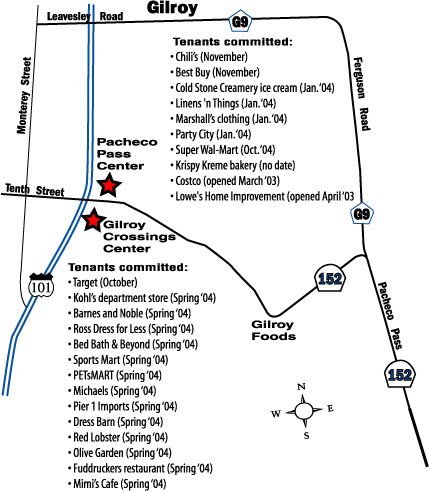GILROY
– If Wal-Mart relocates to the new Pacheco Pass shopping center,
the roughly 67,200-square-foot building it would vacate on Arroyo
Circle won’t stay empty for long.
GILROY – If Wal-Mart relocates to the new Pacheco Pass shopping center, the roughly 67,200-square-foot building it would vacate on Arroyo Circle won’t stay empty for long. Bill Lindsteadt, the executive director for the Gilroy Economic Development Corporation, confirmed that “a number of companies” have contacted him and the broker of the Wal-Mart building in recent weeks. Lindsteadt was skimpy on details, but said Nordstrom Rack, Trader Joe’s and Beverly’s Fabric and Craft store are among the businesses that have their eye on the Arroyo Circle lot.
“Trader Joe’s doesn’t operate from that large of a building, so they’d need to partner with someone,” Lindsteadt said. “I don’t have any doubt we’ll fill that building with viable retail. I believe the sales tax revenue (at that site) will be equivalent to what Wal-Mart brings in now.” It is estimated that Wal-Mart produces $300,000 to $500,000 in sales tax yearly for Gilroy.
Having a vacant mammoth box store open on Gilroy’s east side has been one reason some residents oppose Wal-Mart’s attempt to relocate. While news that the building will be easy to fill pleased some Wal-Mart critics, other concerns regarding the Wal-Mart Supercenter proposed for the Pacheco Pass complex still linger and figure to divide candidates vying for City Council and mayor.
Earlier this year, Wal-Mart announced plans to move the super-sized version of its decade-old 7900 Arroyo Circle store into the new regional shopping center at Pacheco Pass and U.S. 101. The new retail complex will be a 220,000-square-foot Wal-Mart Supercenter and will include a grocery store.
Union leaders and other residents worry that a version of Wal-Mart with a grocery store will put east-side supermarkets out of business. They contend that Wal-Mart can undercut the prices of local stores because it does not employ union workers.
Mayoral candidate Lupe Arellano and City Council hopeful Paul Correa said an occupied Wal-Mart building would relieve one concern they have regarding the company’s move. However, the economic impact of Wal-Mart’s grocery store on local businesses represents an even larger concern.
The argument goes like this: Wal-Mart Supercenter moves into east Gilroy with a cheap-priced grocery store luring customers away from existing supermarkets. Those stores go out of business, followed by smaller shops nearby which used to draw their customers from the grocery stores.
“It’s really a plus to hear that the Wal-Mart building won’t be empty,” Arellano said. “My concern, however, is all of the vacancies that could happen.”
For Correa, Wal-Mart moving is one issue, Wal-Mart opening a grocery store is another.
“The bigger concern for me is the impact this could have on the job base here,” Correa said.
The Wal-Mart issue was rekindled Wednesday during a candidates forum when Councilman Roland Velasco, responding to a question, said Nordstrom Rack or Burlington Coat Factory would be moving into the existing Wal-Mart building. The question – which asked candidates how they would replace the “$300,000 in sales tax revenue” if Wal-Mart left Gilroy altogether – was pointed at union-endorsed candidates critical of the nation’s largest retailer.
Velasco, who is not union-backed, said he does not anticipate losing the equivalent of Wal-Mart’s sales tax revenue since Nordstrom and Burlington wanted to move in.
“I think those (stores) would be natural extensions of the Outlets,” Velasco said.
Lindsteadt, Gilroy’s economic development guru, agreed that reduced-price clothing stores would be a nice fit for the Outlet stores, but said there was no reason to believe Nordstrom Rack and Burlington Coat Factory were any more likely than other interested businesses, including another grocery store like Trader Joe’s.
“It’s not a big box store, but it’s something that I’d have to take a look at,” Correa said. “I’d want to see what kind of impact they’d have on the city.”
Trader Joe’s is described as a discount gourmet shop by some patrons. The company produces many of its own grocery brands, selling some items – like Napa Valley wine – for as cheap as $1.99.
As for the Wal-Mart Supercenter issue, City Council could approve the relocation without permitting the grocery store component, city planner Melissa Durkin said.
“If Council, for whatever reason, felt a grocery store was not appropriate they could … restrict the use and prevent the grocery store,” Durkin said.
Durkin said Council would likely have to find specific reasons the store would not be appropriate, giving Wal-Mart an opportunity to remedy the situation.
Wal-Mart would not speculate about whether they would relocate if a grocery store were not approved, but spokeswoman Daphne Moore said “a key factor to relocate the existing Wal-Mart is to provide customers with groceries.”
For Lindsteadt, who was at the Wednesday forum, candidate responses to the Wal-Mart question and similar economic development issues rubbed him the wrong way.
“I heard so many of them talking about how we should bring more industrial jobs to Gilroy and that we have enough retail now,” Lindsteadt said. “They forget that about 90 industries were brought into the community over the last six to seven years. We brought light industry from metal fabrication and engineering companies to ‘clean room’ labs and microelectronics facilities.
“That’s a pretty across the board mix of uses,” Lindsteadt said.














